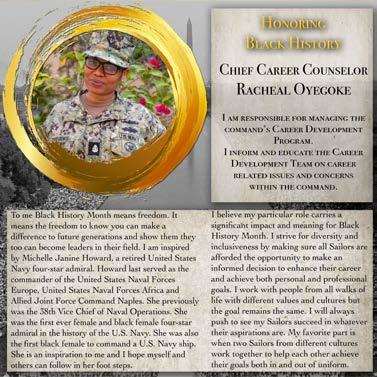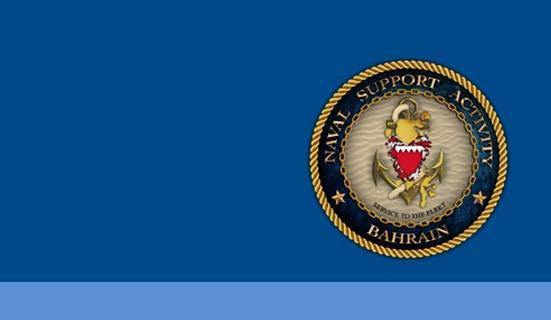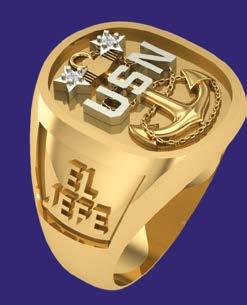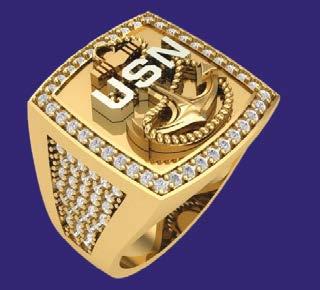

NAVSUP FLC Bahrain Sailors Selected for Contracting Officer Program
By Margaret Algarin, NAVSUP FLC MANAMA, Bahrain -- Naval Supply SystemsCommand (NAVSUP) Fleet Logistics Center (FLC) Bahrain has two Sailors participating in the NAVSUP Enlisted Contracting Officer (NEKO) Pilot Program. The program is designed to develop Navy enlisted personnel into skilled contracting professionals and will enhance support to the Navy of the future. Upon completing the 24-month program, each Sailor will receive a professional contracting certification and become a Contract Specialist with Navy Enlisted Classification (NEC) 722A.
The NEKO Pilot program aims to present a career path for enlisted sailors to become contracting professionals. The program endeavors to address an enterprise-wide challenge in maintaining a trained and ready acquisition workforce that is prepared to deploy Contracting Officers (KO) globally for contingency and expeditionary operations, delivering capabilities down range.
The program is open to enlisted sailors, E-4 to E-7 with undergraduate degree in any concentration or Sailors that have a plan to complete their degrees no later than the end of the 24 month program period. Successful applicants are chosen for this unique opportunity after a rigorous selection process. Although civilians make up the majority of the Navy’s acquisition workforce, the program intends to build sailors’ skill sets to enhance the Navy’s recruitment and hiring flexibility.

“We are really fortunate to have a role in this exciting pilot program,” said Rick Bauer, Director of Contracts, NAVSUP FLC Bahrain. "The NEKO Program prioritizes the growth and development of its participants by providing enlisted sailors comprehensive training and mentorship from experienced contracting professionals.”
Program participants will undergo intensive training and mentorship, acquiring the necessary skills and knowledge to award
and administer contracts effectively. They will attend four Defense Acquisition University (DAU) contracting courses that are composed of virtual instructor-led training, on the job training, and self-paced learning spanning over 196 hours. A final proctored exam will be administered, and graduates of the program will receive a professional contracting certification.
“This program allows me and other Supply professionals to gain invaluable
knowledge and skills to be utilized in the Navy,” said LSC (SW/AW) Jaleka D. Muse, NAVSUP Fleet Logistics Center Bahrain. “It provides a top-down observation into how things happen in the Fleet. I am looking forward to expanding my knowledge toolbox and continuing my contribution and support to the Navy.”
By leveraging the talent and dedication of enlisted personnel, the NEKO program aims to expand the contracting workforce in order to streamline procurement processes, saving time and resources. This increased efficiency allows the Navy Supply Corps to find adaptive solutions to help meet the needs of the warfighter. The NEKO Program helps meet the Navy's central pillars of "Workforce Development," "Knowledge Capture," and "Knowledge Sharing." Through dynamic interactive classroom and on-the-job skills training, NAVSUP is developing the procurement professionals of the future.
NAVSUP FLC Bahrain is one of eight FLCs under Commander, NAVSUP. Headquartered in Mechanicsburg, Pennsylvania, NAVSUP employs a diverse, worldwide workforce of more than 25,000 military and civilian personnel. NAVSUP and the Navy Supply Corps conduct and enable supply chain, acquisition, operational logistics and Sailor & family care activities with our mission partners to generate readiness and sustain naval forces worldwide to prevent and decisively win wars. Learn more at www. navsup.navy.mil, www.facebook.com/ navsup and https://twitter.com/NAVSUP.
International Maritime Security Construct Holds Change of Command
By NAVCENT Public AffairsMANAMA, Bahrain -- The International Maritime Security Construct (IMSC) held a change of command ceremony onboard Naval Support Activity Bahrain, Feb. 20.
Royal Navy Commodore Andrew Canale assumed command of IMSC from Royal Navy Commodore Peter Laughton. IMSC is a 12-nation international coalition that monitors merchant shipping through key regional maritime chokepoints.
Canale also assumed command of IMSC’s Coalition Task Force (CTF) Sentinel from Royal Saudi Naval Forces Commodore Saleh

Aloufi. CTF Sentinel is the operational task force for IMSC.
IMSC was formed in July 2019 in response to increased threats to freedom of navigation for merchant mariners transiting international waters in the Middle East. CTF Sentinel was established four months later.
“It has been a real pleasure to lead you as we’ve developed IMSC and fought hard to deliver our mission in a rapidly changing strategic environment,” Laughton told the assembled IMSC members during the ceremony. “Your dedication, commitment to the mission, and good humor has made my


time as your commander such a memorable experience.”
Canale takes command from Laughton after serving two years at the Royal Navy’s Fleet Operational Standards and Training center in Portsmouth, United Kingdom. Canale has commanded three surface vessels during his career, and has served as an equerry to Her Majesty The Queen.
“It is an incredible privilege to assume command of IMSC and CTF Sentinel at such a dynamic time,” said Canale. “Together with our partners, we will do our utmost to show presence where it is needed, and to

reassure the merchant shipping community of our commitment to peace and security in the global commons.”
Headquartered in Bahrain, IMSC promotes collaboration among member nations to deter threats and reassure regional mariners in and around the Strait of Hormuz and Bab al-Mandeb. Its operational task force, CTF Sentinel, monitors maritime activity in the region. Current members include Albania, Bahrain, Estonia, Jordan, Latvia, Lithuania, Romania, Saudi Arabia, Seychelles, United Arab Emirates, United Kingdom and United States.



CELEBRATE BLACK HISTORY MONTH WITH NSA BAHRAIN!



CENTCOM Intercepts Iranian Weapons Shipment Intended for Houthis
By NAVCENT Public AffairsTAMPA, Fla. - A U.S. Coast Guard cutter, forward deployed to the U.S. Central Command (CENTCOM) area of responsibility, seized advanced conventional weapons and other lethal aid originating in Iran and bound to Houthi-controlled areas of Yemen from a vessel in the Arabian Sea on Jan. 28.
The U.S. Coast Guard Sentinel-class fast-response cutter USCGC Clarence Sutphin Jr. (WPC 1147), assigned to U.S. Naval Forces Central Command, located the vessel and boarded it in the Arabian Sea. The boarding team discovered over 200 packages that contained mediumrange ballistic missile components, explosives, unmanned underwater/surface vehicle (UUV/USV) components, militarygrade communication and network equipment, anti-tank guided missile launcher assemblies, and other military components.
The direct or indirect supply, sale or transfer of such aid violates U.N. Security Council Resolution 2216 (as extended and renewed by resolutions 2675 and 2707).
“This is yet another example of Iran’s malign activity in the region,” said Gen. Michael Erik Kurilla, CENTCOM commander.

“Their continued supply of advanced conventional weapons to the Houthis is in direct violation of international law and continues to undermine the safety of
international shipping and the free flow of commerce.”
CENTCOM is committed to working with our allies and partners to counter
U.S. and U.N. sanctions and through interdictions.
Medal of Honor Monday: Army Master Sgt. Fred W. Zabitosky
By Katie Lange , DOD NewsSpecial Forces soldiers serving during the Vietnam War often operated behind enemy lines during treacherous situations. Army Master Sgt. Fred William Zabitosky did this often with his team of Green Berets. During a 1968 helicopter crash, he refused to give up on the men around him. His efforts that day earned him the Medal of Honor.
Zabitosky was born Oct. 27, 1942, into a poor community in Trenton, New Jersey, to parents Cora and Fred T. Zabitosky. When Zabitosky was 15, his father left the family, forcing the teen to take responsibility for his mother, brother and three sisters. To earn money for the family, Zabitosky dropped out of high school after his junior year. At age 17, he realized that joining the military could offer better stability and support, so in 1959, he enlisted in the Army.
After basic training, Zabitosky was sent to Germany for three years, where he served with distinction before coming home and rejoining civilian life. He got a job working construction, but he wasn't happy with that, so he decided to reenlist in 1963, this time to join the Special Forces. After much training, he became a Green Beret with the 5th Special Forces Group.
In 1964, Zabitosky married his girlfriend, Carrie Mae, before being sent to Vietnam. He returned a year later to his wife and his first child, a boy named Edward. Soon after, however, Zabitosky itched to return to the action, so he volunteered to go back to the war zone, where he helped train South Vietnamese soldiers. He again returned home just to volunteer to go back to Vietnam for a third tour of duty in 1968. It was on this deployment during the height of the Tet Offensive that he earned the Medal of Honor.
Zabitosky's team was tasked with monitoring the Ho Chi Minh Trail, which often required crossing into neighboring Laos and Cambodia on convert missions. On Feb. 19, 1968, during one of these quests into Laos, Zabitosky was the assistant team lead of a nine-man reconnaissance patrol that stumbled into a large enemy complex. Quickly, all hell broke loose.
According to his Medal of Honor citation, Zabitosky exposed himself to enemy fire so he could rally his comrades and deployed them into defensive positions to return fire. When he realized how outnumbered they were,

he ordered them to move to a landing zone for helicopter extraction, all while he covered their withdrawal with rifle fire and grenades.
After about an hour and a half of his team maintaining a tight position to keep the enemy at bay, three helicopters finally arrived. But the North Vietnamese continued to press their attack, which forced Zabitosky to repeatedly expose himself to more danger so he could "adjust suppressive helicopter-gunship fire around the landing zone," his citation said.
Eventually, he and a few of his men got onto the second helicopter. Zabitosky positioned himself by the door so he could continue firing at the enemy as it took off. As it did, a rocket-propelled grenade came straight toward them, hitting the helicopter in the tail and causing it to crash.
Zabitosky was thrown from the aircraft and initially lost consciousness. When he came to, he was seriously injured — he later learned he'd broken his back and several ribs — but he ignored the extreme pain and ran to the chopper wreckage to try to save those stuck inside. Ignoring the dangers of fuel and ordnance exploding around him,
Zabitosky managed to pull the severely wounded pilot from the aircraft, as well as the copilot. His citation said he tried to rescue the members of his team who were also on the aircraft, but he was driven back by the intense heat.
Zabitosky managed to drag the two pilots through a hail of enemy gunfire to within 10 feet of a third helicopter that was hovering above the ground. Once he'd loaded the pilots onto it, he tried to go back to the downed chopper one more time, but he collapsed. He was loaded into the third chopper with the pilots and whisked away.
Zabitosky was taken to a hospital in South Vietnam and was unable to walk for about a month. Six weeks into his recovery, he was sent back to the U.S.
On March 7, 1969, just more than a year after his heroic exploits, Zabitosky received the Medal of Honor from President Richard M. Nixon at a White House ceremony. Two other soldiers, Staff Sgt. Joe Hooper and Spc. 5th Class Clarence Sasser, were also given the medal that day.
Zabitosky remained in the Army for nearly another decade, retiring after 18 years of service in 1977, according to the News and Observer newspaper out of Raleigh, North Carolina. He and his family, which expanded to include a daughter, remained in North Carolina.
As a civilian, Zabitosky continued working with the military as a counselor for the Department of Veterans Affairs at Fort Bragg. In February 1982, he made one last trip to Vietnam, this time to investigate the possible existence of American prisoners of war and those missing in action.
Zabitosky died on Jan. 8, 1996, after undergoing surgery to treat a cancerous brain tumor, according to the News and Observer. He is buried in Lumbee Memorial Gardens in Lumberton, North Carolina.
The celebrated Green Beret's name may be familiar to any Special Forces service members visiting Fort Bragg, which is now Fort Liberty. The main thoroughfare at the Special Warfare School — Zabitosky Street — is named in his honor. In 2017, a memorial display dedicated to Zabitosky was also erected at the Ewing Township Municipal Building near his hometown.
In 2019, Zabitosky's Medal of Honor was put on display at the U.S. Army Airborne and Special Forces Museum in North Carolina. It's now currently part of the JFK Presidential Library and Museum collection.



439-4520
www.cnic.navy.mil/bahrain
Commanding Officer
Naval
Capt.
NSA Bahrain Executive Officer
Cmdr. Jimmy Harmon
Host Nation
Mass






YOU CAN NEVER STEP IN THE SAME RIVER TWICE.
The idea that change is the only constant goes back ages and is captured in the quote above originating from Heraclitus, a 5th Century Greek philosopher from Ephesus (modern day Turkey). A river, in order to be a river not stagnant water, is constantly changing. The water in constant motion is sometimes placid as glass, sometimes rushing with urgency, sometimes violent and churning with sudden drops and collisions with rocky obstacles. However a river proceeds, it always proceeds.
Such is life. If we are riding through life as if on a kayak we find that sometimes we can go with the flow; our days proceed with little effort or worry as the river gently carries us on our way. Other times we must paddle with all our might to avoid physical or emotional danger. Lest we wreck, we must paddle against unfavorable and powerful currents which threaten to sweep us away from our intended direction, i.e. our values.
As far as I know, Heraclitus did not own a kayak and was not into white water rafting. He merely observed the ever changing nature of a river. Upstream waters become downstream waters. From a vantage point beside the river, blink and the water before you has been replaced. Change is the only constant.
Most of us wrestle with change because familiarity breeds comfort. But familiarity also breeds contempt. We acclimate to the “devil you know” and fear the unknown. But what if the unknown future will be better than the known present?
Perhaps you have been to the nearby Dead Sea. The sea is “dead” and void of living creatures because unlike the river that feeds it, the Dead Sea goes nowhere. The water is stagnant, it no longer moves. The sea is a dead end with no outlet, no future, no motion, no change.
When the world-like a river-changes before us into something unfamiliar, unknown, and unpredicted, we might wish for a return to normalcy, to balance, to homeostasis. Instead of wishing and instead of nostalgia, what if we adapted to changes?
Peter Sterling of the University of Pennsylvania and his late colleague Joseph Ayer coined the term allostasis. Allostasis is different from homeostasis in that the latter is about being stable by being the same and the former is about rediscovering stability through change. Brad Stulberg, author of Master of Change, says, “The way to be stable through change is by changing, by getting to a reorder by not trying to go back to the old order.”
As difficult as adapting may be, we must remember that adaptation is key to survival. So it goes with species and cell phones (where are all the Blackberries and Nokias that once ruled the market?). What if we saw our lives less as travelers across or down a river, and more as the river ourselves? Bruce Lee said one should be like water. Water adapts. And flows. In river form water is not boundless, it is hemmed in and guided by its banks which for us are our values (credit to Stulberg for this imagery). May we live our lives flowing not stagnant, adapting not resisting, full of life not emptiness because, like the Dead Sea, we only always ever receive and never give. Open yourself up to change and open yourself up to others.





New MOVIES at the MWR Cinema



Madame Web (PG-13) – 1h 56m
Cassandra Webb is a New York City paramedic who starts to show signs of clairvoyance. Forced to confront revelations about her past, she must protect three young women from a mysterious adversary who wants them dead.
| Cast: Sydney Sweeney, Dakota Johnson, Isabela Merced, Emma Roberts
The Beekeeper (R) – 1h 45m
One man's brutal campaign for vengeance takes on national stakes after it's revealed he's a former operative of a powerful and clandestine organization known as Beekeepers.
| Cast: Jason Statham, Josh Hutcherson, Amber Sienna, Emmy Raver-Lampman


Bob Marley: One Love (PG-13) – 1h 47m
Jamaican singer-songwriter Bob Marley overcomes adversity to become the most famous reggae musician in the world.
| Cast: Kingsley Ben-Adir, Lashana Lynch, Michael Gandolfini, James Norton
American Fiction (R) – 1h 57m
Monk is a frustrated novelist who's fed up with the establishment that profits from Black entertainment that relies on tired and offensive tropes. To prove his point, he uses a pen name to write an outlandish Black book of his own, a book that propels him to the heart of hypocrisy and the madness he claims to disdain.
| Cast: Jeffrey Wright, Sterling K. Brown, Erika Alexander, Issa Rae































































































